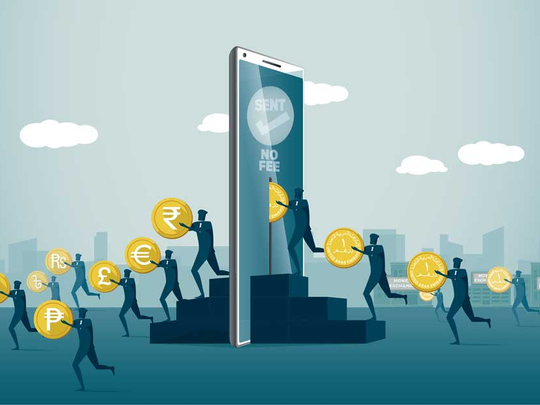
For long-term residents of the UAE, Amit Vardhan’s experience is familiar. The Dubai resident has been sending money home to his family in India for more than 17 years, using the same remittance company for much of the time. “I don’t shop around because of the convenience and customer service the money transfer firm offers me,” says Vardhan, who is an advertising professional. “The exchange house not only provides me good rates and services but also offers me a facility of cheque collection from home.”
Ripe for change
The remittance business, a lifeline for millions of expatriates in the UAE, has long seemed ripe for digital disruption. Traditionally, it has been dominated by cash, requiring physical locations where customers hand over and collect money. Today there are several changes afoot. Banks, exchange houses and fintech firms are increasingly looking to adopt emerging technologies to cut the costs of doing business in a competitive market.
Today it makes sense for remitters to shop around before selecting a service provider to maximise savings on the cost of transfer. Remittance companies make their money from a service fee they charge on each payment sent, usually a percentage of the amount transferred and an added cost into the exchange rate consumers pay.
Rising demand
Online brokerage Global Currency Exchange Network (GCEN) is investing in enhancing online services to meet growing demand from the UAE and the wider region. “Almost all of our clients in the UAE use our online service to exchange currency as it’s far more convenient than visiting a local bank or counter service, and it allows our clients to receive our most competitive currency rate in real time,” says Grant Henderson, Head of Middle East Operations at GCEN.
“However, we also understand clients may need to discuss their specific needs if transacting large amounts of money so our staff in our Dubai Marina office are always on hand to assist clients.”
In the past year alone, GCEN transacted more than $4 billion (Dh14.6 billion) in foreign exchange for clients with the most popular destinations from the UAE being the UK, Europe and the US.
UAE banks such as Emirates NBD and Mashreq have invested in technology to transfer money instantly with zero transaction fees. “In a market that has been traditionally dominated by exchange houses, Emirates NBD’s 60-second DirectRemit money transfer service has successfully been able to disrupt the status quo to become the remittance service of choice for customers,” says Suvo Sarkar, Senior Executive Vice-President and Head — Retail Banking and Wealth Management at Emirates NBD.
Skip the line
Avoiding queues to send money is another incentive, especially at peak times, adds Sarkar. “During festive times or the holiday season when remittance volumes tend to spike sharply, Direct Remit is an easy way for customers to remit funds without having to wait in long queues. It enables instant fund transfers to all major remittance markets through the bank’s online and mobile banking platforms, free of charge and at competitive rates.”
Typically, the standard transfer fee on remittances from the UAE is between Dh15 to Dh70, depending on the place where the money is sent, with an additional 5 per cent VAT on the service charges.
“In recent years, remittance costs in the UAE have fallen significantly and they are now some of the lowest in the world,” says Rohit Garg, Head of
Business Banking, Mortgages and Remittances at Mashreq. “Additionally, customers here enjoy some of the fastest, most sophisticated, convenient
and advanced remittance services on the planet — all available 24/7 at the touch of a button.”
Mashreq introduced its Quick Remit service to help customers who would previously have had to wait in long queues to remit their money. “Many
customers don’t appreciate that the cost of a remittance includes both the fees for the transaction and the exchange rates that are applied. Quick Remit takes a simple and transparent approach, ensuring that customers are clear on the actual cost of remitting their funds — making it more efficient and economical.”
Traditional money exchange players are also adopting technology to send money overseas faster and at cheaper rates. Founded in 1980, UAE Exchange is one of the country’s oldest exchange houses. It has a sizeable retail presence with more than 800 stores across 31 countries and a large, loyal customer base. Nevertheless, the organisation has identified opportunities in partnering with disruptive fintech start-ups.
In February, it partnered with US blockchain start-up Ripple to facilitate real-time cross-border remittance payments as it looks to bring the cost of transactions down for its customers. “The early adoption of this game-changing technology allows us to offer a competitive service, as it will have an impact on the speed and cost of cross-border transactions,” Promoth Manghat, CEO of UAE Exchange Group, said in a statement at the time.
Digital partnerships
Collaborating with startups helps traditional players in the market to gain ground while also helping them stay relevant. LuLu Exchange, which has over 180 branches across the UAE, Oman, Kuwait, Bahrain, India, the Seychelles and Philippines, invested $3.5 million (Dh12.8 million) in tech start-up Arkin Technologies earlier this year.
With plans to shift nearly 30 per cent of its transactions to the digital platform by 2020, “the partnership with Arkin is aimed at offering customers simple and smart digital financial solutions”, said Adeeb Ahamed, Managing Director, LuLu Exchange, in a statement.








